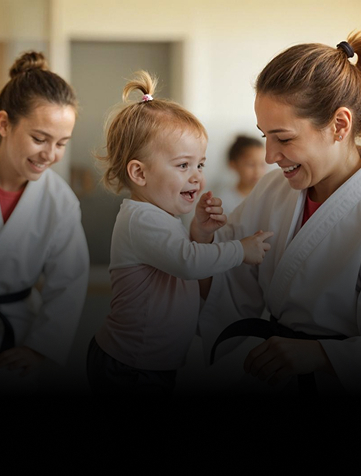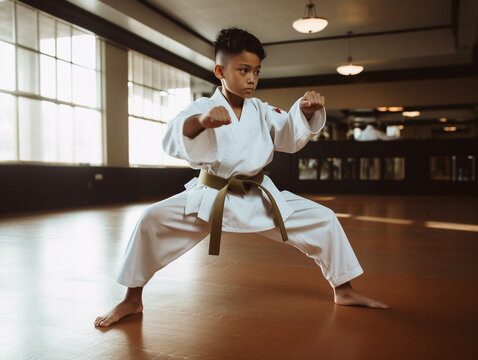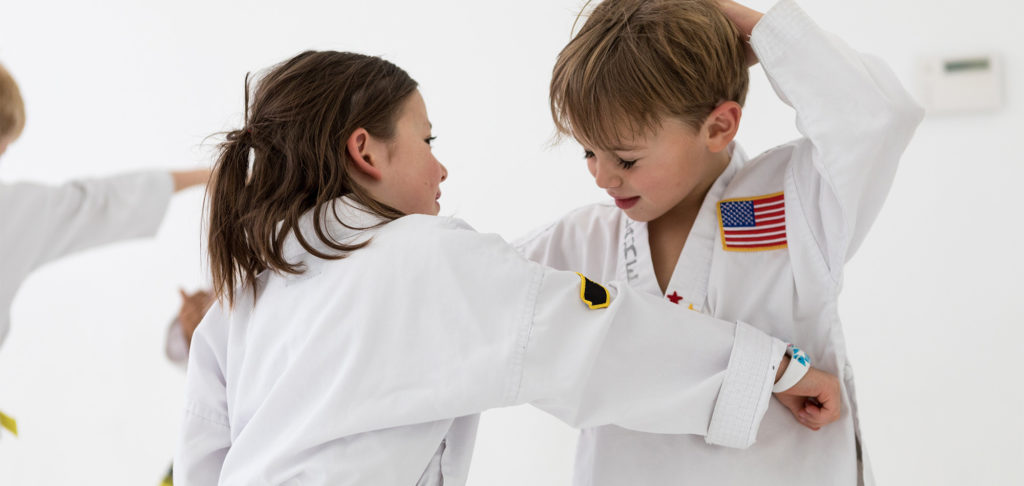Exactly How Karate for Children Can Increase Self-confidence and Self-control in Youthful Martial Artists
Karate for children uses a distinct possibility to build confidence and self-control in young martial musicians. As they discover brand-new techniques and face difficulties, they not just acquire skills yet likewise develop a strong sense of self-regard. This organized environment motivates them to appreciate the trip of renovation. But exactly how does this training equate right into their day-to-day lives? Discover the much deeper links that make karate greater than just a sport.
The Value of Self-confidence in Childhood Years Development
Confidence is a necessary foundation in childhood years advancement. When you nurture your kid's self-confidence, you equip them to deal with difficulties, take risks, and reveal themselves openly. Children with self-confidence are a lot more eager to discover social scenarios and brand-new activities, which can result in long lasting relationships and valuable experiences.Encouraging your child to get out of their convenience area promotes durability. They discover that failing isn't completion however rather a stepping rock to success. By commemorating their accomplishments, despite just how tiny, you assist them acknowledge their abilities and worth.In this journey, assistance and positive support from you play a vital duty. Whether it's via praise or simply being present, your participation enhances their self-confidence. As they expand, this self-assurance ends up being a long-lasting asset, furnishing them to browse both challenges and opportunities with a solid sense of self.
Just How Karate Teaches Technique and Focus
Martial arts helps you construct discipline and emphasis through its organized training routine. As you practice mindfulness throughout each session, you'll discover to concentrate far better both on and off the mat. And also, establishing and accomplishing objectives in martial arts strengthens your ability to remain mindful and fully commited.
Structured Training Regimen
While you take part in karate training, you'll promptly discover exactly how a structured program infuses self-control and emphasis in young professionals. Each course follows a specific style, consisting of workouts, technique method, and sparring. This uniformity teaches you to appreciate the procedure and commit to enhancement. As you find out methods and types, you establish a sense of duty for your very own progress.The structured environment motivates you to establish objectives, whether mastering a new belt or perfecting a kata. You'll find that remaining focused during drills and classes develops your focus. The technique you grow in martial arts expands beyond the dojo, favorably affecting your schoolwork and day-to-day regimens. Each session strengthens the relevance of devotion, aiding you turn into a much more regimented person.
Mindfulness in Method
As you practice martial arts, you'll find that mindfulness becomes a crucial part of your training. Each move requires your complete focus, aiding you remain concentrated on the here and now moment. You'll find out to disregard distractions and focus on your breathing, movements, and intentions. This increased understanding hones your reflexes and enhances your discipline.During sparring or forms, you'll uncover the relevance of being emotionally existing - Karate Salisbury MD. You'll discover just how this emphasis not only boosts your method however likewise develops your self-confidence. By exercising mindfulness in martial arts, you grow persistence and resilience, vital characteristics that expand past the dojo. This way, martial arts shows you to harness your mind, assisting you create a regimented approach to obstacles both on and off the mat

Setting Goal Techniques
Setting goals in karate isn't simply about earning belts; it's a powerful way to cultivate discipline and focus. When you establish particular, attainable targets, you produce a roadmap for your development. Instead of just aiming to improve your kicks, try concentrating on understanding a specific method each month. This approach keeps you motivated and engaged.Breaking down bigger objectives into smaller, manageable actions aids you track your progression and commemorate little success along the road. Whether it's refining your stance or increasing your sparring endurance, every goal reinforces your commitment. As you attain these goals, you'll build confidence in your abilities and create a solid feeling of self-control that prolongs beyond the dojo right into daily life.
Building Resilience Via Martial Arts
Martial arts, particularly karate, provides kids a distinct chance to build resilience in a supportive setting. In classes, they deal with obstacles that press their limits, whether it's competing or understanding a new method with a partner. Each obstacle, like a missed kick or a lost suit, becomes a possibility to find out and grow.As they practice, children learn to accept pain and keep trying, also when points get hard. They uncover that failure isn't completion; it becomes part of the journey. This state of mind assists them recuperate more powerful, not just in the dojo, yet in everyday life.With each difficulty they get over, your child builds self-confidence in their capacity to tackle obstacles, fueling their resolution. Via karate, they'll comprehend that strength isn't practically physical strength; it's regarding psychological grit and willpower, empowering them to deal with whatever life tosses their means.
The Duty of Respect in Karate Training
Respect is a foundational concept in karate training, promoting a society of discipline and camaraderie among students. When you step onto the dojo floor, you're not simply finding out strategies; you're additionally finding out to respect your instructors, peers, and the art itself (Karate Salisbury MD). Bowing at the beginning and end of class isn't just a rule; it represents your acknowledgment of others' dedication.as and efforts you develop mutual respect, you'll discover it improves your learning experience. You'll pay attention a lot more attentively to your instructor and gain insights from fellow pupils. This atmosphere motivates constructive objection and assistance, enabling everyone to grow together.Moreover, regard grows self-discipline. Recognizing the worth of tough job and humility aids you remain concentrated on your training. Consequently, this respect translates right into your day-to-day life, enhancing your interactions and relationships outside the dojo. Through karate, you learn that regard is essential for individual development and neighborhood building
Accomplishing and setting objectives Success in Karate

Social Skills and Teamwork in the Dojo
While training in the dojo, kids naturally create vital social abilities and team effort capabilities. As they practice alongside peers, they learn to connect effectively, share room, and support each other. Each course offers chances for partnership, whether it's during companion drills or team exercises. This synergy promotes relationships and develops a sense of belonging, making the dojo a nurturing environment.Kids also obtain useful conflict resolution abilities. When they encounter difficulties, such as differences during sparring, they learn to browse these situations constructively. They exercise patience and compassion, comprehending that everyone has different toughness and weaknesses.Moreover, taking part in team activities grows a sense of liability. You'll see your child discovering to count on colleagues and take duty for their role in a team. These experiences not just enhance their martial arts journey yet also furnish them with social devices they'll carry into various other locations of life.

The Long-Term Perks of Karate Beyond Childhood
As kids grow up and move right into the adult years, the benefits of karate expand much beyond the dojo. You'll find that the technique and emphasis discovered with karate can translate right into your professional and scholastic life. Setting and achieving objectives in fighting styles promotes a strong job ethic, which can push you to excel in any kind of endeavor.Moreover, the self-confidence acquired from sparring and understanding techniques can boost your self-confidence, helping you tackle obstacles head-on. This durability becomes invaluable as you encounter the uncertainties of adulthood.Additionally, the social abilities developed with teamwork and sociability in the dojo can result in far better partnerships in both expert and personal spheres. You'll learn to interact efficiently, willpower conflicts, and develop an encouraging network.Ultimately, karate shapes not just experienced martial musicians, yet all-around people all set to take on the globe.
Regularly Asked Questions
What Age Is Finest to Beginning Martial Arts for Kids?
You can begin martial arts as early as age four or 5, yet it frequently depends upon your youngster's maturity and rate of interest. Locating a class that fits their age and power degree makes a big difference.
Exist Any Kind Of Health Advantages From Practicing Karate?
Yes, exercising karate deals numerous health and wellness advantages. You'll boost your adaptability, toughness, and coordination while enhancing cardio physical fitness. And also, it improves focus and mental well-being, making it an amazing selection for general physical and mental health.
How Often Should Kids Participate In Martial Arts Classes?
You ought to motivate check here your youngsters to attend karate classes at the very least a couple of times a week. Consistency aids them find out methods effectively and develop abilities, making their experience a lot more gratifying and pleasurable in the lengthy run.
Can Karate Aid With Managing Anxiousness in Children?
Yes, martial arts can aid handle stress and anxiety in children. It educates focus and self-control while providing a secure outlet for energy. You'll see your kid growing extra positive and calm as they practice frequently.
What Equipment Is Needed for Children Starting Martial Arts?

Comments on “Best Martial Arts for Families – Train, Grow, and Train as a Family Group”